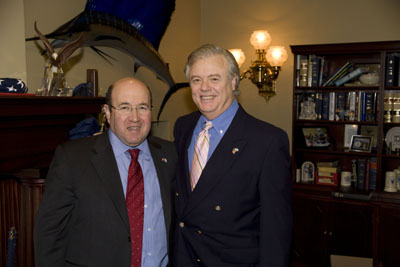FUMO WANTS STATE FUNDS OUT OF
IRANIAN ENERGY INVESTMENTS
HARRISBURG, February 12, 2008
– State Senator Vince Fumo (D-Philadelphia) has introduced legislation to
require the state’s two public pension funds and the State Treasurer to divest
from companies with direct business ties to Iran’s energy sector. In addition to
Fumo, a bipartisan group of 21 other Senators – eight Republicans and 13
Democrats – is co-sponsoring the bill (SB 1279.)
“There is a compelling moral argument for divesting
from companies that do business with the government of Iran,” Fumo said. “Not
only does Iran continue to pursue policies openly hostile to our broader
interests of peace and stability in the Middle East, but it remains one of the
world’s most active state sponsors of terrorism.”
He also pointed out that there is a strong fiduciary
argument for divestment. Under the federal Iran Sanctions Act of 1996, foreign
companies that invest more than $20 million in Iran’s energy sector are subject
to a variety of U.S. sanctions. The law was recently strengthened, closing
loopholes, and increasing the liklihood that sanctions will be imposed. Publicly
traded companies doing business with Iran are thus putting their share value at
risk.
Click here to listen to audio of Senator Fumo
discussing Iran Divestiture
Click here to see a video
of Senator Fumo answering questions about Iran Divestiture
The State Employees Retirement System (SERS) and the
Public School Employees Retirement System (PSERS) both currently have holdings
in 12 companies that violate the Iran Sanctions Act – China Petroleum and
Chemical; ENI SPA; Gazprom; Lukoil Oil Co.; Norsk Hydro; Oil and Natural Gas;
Petrochina Co.; Petroleo Brasileiro; Repsol; Royal Dutch Shell; Statoil ASA; and
Total SA.
In addition, SERS owns CNPC Hong Kong LTD, and PSERS
holds Oil Co. Lukoil; and OMV AG.
Fumo’s bill targets the Iranian energy sector because
it is the most critical of Iran’s economy. Foreign investment in the petroleum
business accounts for 80 percent of the country’s hard currency. While having
the biggest impact on Iran, it is limited in scope, thus minimizing the impact
on public funds in the United States. There are only 19 companies potentially
affected, all of which are non-American, and all of which have equally
profitable foreign oil company alternatives.
The Iran divestment legislation has five main
components. It will:
• Require the fund to review its holdings in companies investing at least $20
million in Iran’s energy sector.
• Require the fund to notify such companies of their status and the fund’s
intent to divest unless the company ceases activity in Iran.
• Mandate the fund divest from its direct holdings in these companies within one
year following the notification.
• Call on pension fund managers to review their holdings in co-mingled
investments, and explore the possibility of creating alternative funds devoid of
these holdings.
• Require a report to the state legislature annually from the state pension
funds and the treasurer on their status and actions related to divestiture.
Four states – Florida, Illinois, California and New
Jersey – have already passed Iran divestment bills, and similar legislation is
moving in three other states – Maryland, Michigan and Massachusetts. Three other
state have taken non-legislative Iranian divestment action and another seven are
considering legislation in their upcoming sessions.
Also, the U.S. government is going after international
banks doing business in Iran and the European Union is lessening its economic
involvement there. The United National Security Council has twice passed
resolutions imposing sanctions and is considering a third, more punitive one.
Several pieces of legislation before Congress would further increase economic
pressure on Iran.
“While many efforts are underway, it is important for
Pennsylvania to do its part by removing from Iran the investments that we can
control,” Fumo said. “We should lend our voice to the international call for
Iran to halt its terror-related activities if it wishes to enjoy the financial
benefits of being a good world citizen.”

Uriel Palti (left), Consul General of Israel,
visited Senator Fumo in Harrisburg on January 30 and discussed Fumo's
proposed Iranian divestiture bill.
# # #
Click here to see a press release in support of this legislation from the
Pennsylvania Jewish Coalition


